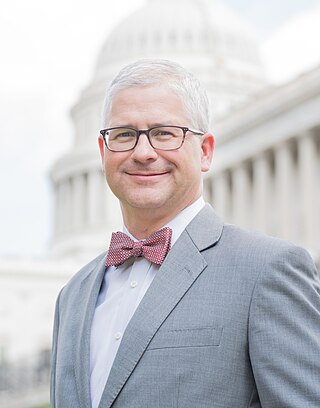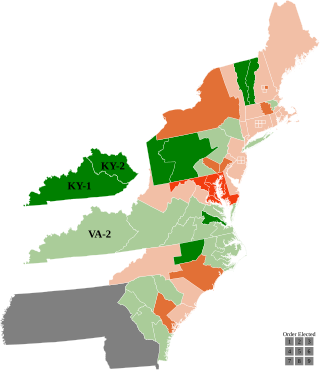
Patrick Timothy McHenry is an American politician currently serving as U.S. representative for North Carolina's 10th congressional district since 2005, which includes the communities of Hickory and Mooresville. He is also chair of the House Financial Services Committee since 2023. A member of the Republican Party, he served as a member of the North Carolina House of Representatives for one term before being elected to Congress.

Edolphus "Ed" Towns Jr. is an American educator, military veteran, and politician who served in the United States House of Representatives from 1983 to 2013. A Democrat from New York, Towns was Chairman of the House Oversight and Government Reform Committee from 2009 to 2011.

The 1826–27 United States House of Representatives elections were held on various dates in various states between July 3, 1826, and August 30, 1827. Each state set its own date for its elections to the House of Representatives before the first session of the 20th United States Congress convened on December 3, 1827. They occurred during John Quincy Adams's presidency. Elections were held for all 213 seats, representing 24 states.

The 1822–23 United States House of Representatives elections were held on various dates in various states between July 1, 1822, and August 14, 1823. Each state set its own date for its elections to the House of Representatives before the first session of the 18th United States Congress convened on December 1, 1823. They occurred during President James Monroe's second term.
The 1818–19 United States House of Representatives elections were held on various dates in various states between April 26, 1818 and August 12, 1819. Each state set its own date for its elections to the House of Representatives before the first session of the 16th United States Congress convened on December 6, 1819. They occurred during President James Monroe's first term. Also, newly admitted Alabama elected its first representatives in September 1819, increasing the size of the House to 186 seats.
The 1816–17 United States House of Representatives elections were held on various dates in various states between April 30, 1816 and August 14, 1817. Each state set its own date for its elections to the House of Representatives before the first session of the 15th United States Congress convened on December 1, 1817. The size of the House increased to 184 after Indiana and Mississippi achieved statehood.

The 1806–07 United States House of Representatives elections were held on various dates in various states between April 29, 1806 and August 4, 1807. Each state set its own date for its elections to the House of Representatives before the first session of the 10th United States Congress convened on October 26, 1807. They occurred during Thomas Jefferson's second term. Elections were held for all 142 seats, representing 17 states.

The 1800–01 United States House of Representatives elections were held on various dates in various states between April 29, 1800, and August 1, 1801. Each state set its own date for its elections to the House of Representatives before the first session of the 7th United States Congress convened on December 7, 1801. They were held at the same time as the 1800 presidential election, in which Vice President Thomas Jefferson, a Democratic Republican, defeated incumbent President John Adams, a Federalist. Elections were held for all 105 seats, representing 15 states.

The 1796–97 United States House of Representatives elections took place in the various states took place between August 12, 1796, and October 15, 1797. Each state set its own date for its elections to the House of Representatives. The size of the House increased to 106 seats after Tennessee became the 16th state to join the union. The first session of the 5th United States Congress was convened on May 15, 1797, at the proclamation of the new President of the United States, John Adams. Since Kentucky and Tennessee had not yet voted, they were unrepresented until the second session began on November 13, 1797.

The 1790–91 United States House of Representatives elections were held on various dates in various states between April 27, 1790, and October 11, 1791. Each state set its own date for its elections to the House of Representatives before or after the first session of the 2nd United States Congress convened on October 24, 1791. This was the first midterm election cycle, which took place in the middle of President George Washington's first term. The size of the House increased to 67 seats after the new state of Vermont elected its first representatives.

Due to the cession of North Carolina's trans-Appalachian territory to form the Southwest Territory, the territory of the old 5th district was lost. North Carolina retained the same number of Representatives, and so it redistricted for the Second Congress.

North Carolina's delegation remained unchanged after the census, at thirteen seats. North Carolina elected its members August 14, 1823, after the term began but before the new Congress convened.

North Carolina elected its members August 15, 1806.

On January 1, 1818, a special election was held in North Carolina's 7th district to fill a vacancy left by the death of Representative-elect Alexander McMillan (F) before the 15th Congress had assembled.

On November 7, 1818, a special election was held in North Carolina's 11th district to fill a vacancy caused by Daniel M. Forney (DR)'s resignation earlier that year.

A special election was held in North Carolina's 4th congressional district on August 4, 1795 to fill a vacancy left by the death of Alexander Mebane (DR) on July 5, 1795, before the start of the 1st session of the 4th Congress.

North Carolina elected its members August 13, 1829 after the term began but before Congress convened.

Virginia elected its members in April 1819, after the new congress began but before the first session convened.

James Daniel Bishop is an American attorney and politician serving as the U.S. representative for North Carolina's 8th congressional district since 2019, when the district was numbered as the 9th. A Republican, his district includes south-central Mecklenburg, Union, Anson, Richmond, Scotland, Robeson, Hoke, and southern Moore Counties. He served in the North Carolina House of Representatives from 2015 to 2017 and the Mecklenburg County Commission from 2005 to 2009. He served in the North Carolina State Senate from 2017 to 2019.

Gregory Francis Murphy is an American politician and urologist representing North Carolina's 3rd congressional district in the U.S. House of Representatives since 2019. He served as a representative in the North Carolina General Assembly from 2015 to 2019.












